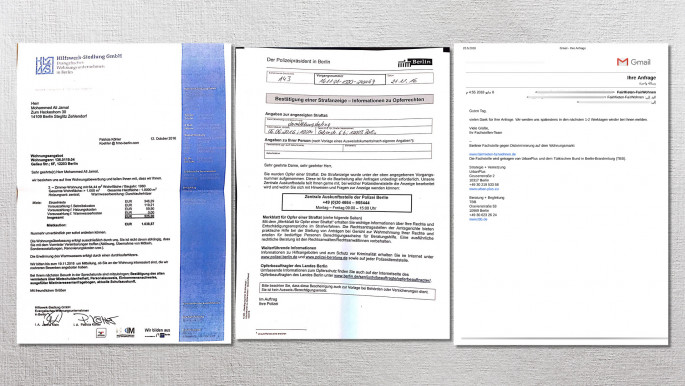Racism in German housing market drives Syrian refugees to scammers and con-artists
He arrived in the capital at the end of 2014 and lived for three years in a housing complex allocated for refugees in the East Berlin district of Marzahn - a stronghold of the anti-immigration Alternative for Germany party.
Homsi, his family and other refugees living in the area, suffered racist abuse after protests demanded the complex be shut down.
He now lives in the West Berlin district of Charlottenburg after he paid 4,000 euros ($4,680) to a broker of Arab origins to secure suitable housing through a real estate company.
In less than a month, he was able to get what he wanted through the broker, who has close relations with several housing firms.
"They ask us to integrate into society and to learn the German language - but I couldn't find a place to live for three years because my requests were ignored," Homsi complained.
Ahmed Jawhar, the owner of a real estate company with a decade of experience in the Berlin housing market, said German authorities had failed to tackle rampant racism.
 |
| [Click to enlarge] |
"The problem surfaced after the 2008 financial crisis and the rapid influx and foreigners to the capital," said Jawhar, whose family is Lebanese.
"Companies are no longer afraid of flats being unoccupied and have begun to purposely ignore requests from applicants with foreign-sounding names - in particular from Arabs and Turks.
"Everyone knows about this but no official measures have been taken to curb the racism. The newly established anti-discrimination office has yet to condemn any of the companies or release a statement about this," Jawhar added.
In June, a joint report by German public broadcaster Bayerischer Rundfunk and news magazine Der Spiegel exposed discrimination against foreigners in the housing market.
Documenting racism
In our investigation, the author used his real name - Bassel al-Hamdo - and chose a random sample of advertised flats from across different parts of the city. Some were owned by Deutsche Wohnen - Berlin's second largest property company.
Refugees we spoke to had singled out Deutsche Wohnen for purposely refusing their applications.
On 16 January, eleven applications were submitted through the company's website and were assigned case numbers, proving they had been registered as under review by the company.
The next day only one response came, informing "Mr Hamdo" that the flat that he was interested in was unavailable "for reasons linked to the number of requests".
The request had been rejected even though it was sent just hours after the apartment had been advertised online.
 |
| [Click to enlarge] |
Weeks later, on February 2, a second belated response arrived, saying that another property had been rented and was no longer on the market.
On 12 February, another 10 applications were submitted for properties around Berlin. On the same, day two rejection emails arrived, giving the same reasons: the apartments had now been rented and were no longer on the market.
The New Arab then arranged for Meret, a Swiss national, Jonas, a German university student, and Frederick, a German journalist, to apply to rent one of the flats at the same time.
On the same day she applied for the apartment, Meret received a positive response from Deutsche Wohnen, asking her to visit their offices to pick up the keys to view the location.
This came just two hours after the company rejected our application for the same property made under the Arab-sounding name.
The next morning, Jonas and Frederick also received positive responses from the company.
The New Arab asked the company to explain their apparent racial profiling in their business practices.
On 6 March, a Deutsche Wohnen spokesperson responded by email, saying the company treated customers the same regardless of ethnicity and that it "stands against forms of racial discrimination".
The spokesman refused to explain the findings of our experiment.
 |
| [Click to enlarge] |
Shady real estate brokers
The housing crisis facing refugees has forced many to take desperate measures to put a roof over their heads.
Real estate brokers, mainly of Arab and Turkish origin, scour refugee housing camps and coffee shops offering their services.
Not a day goes by without refugees complaining about the "scammers".
One unscrupulous real estate broker, who has since admitted his guilt in court, is believed to have defrauded at least 13 refugees, despite admitting to only one case.
For legal reasons, we can't name him, but he targeted vulnerable refugees and claimed to be able to find housing for them. After failing to fulfil his promises, he threatened his victims with legal action, according to WhatsApp conversations seen by The New Arab.
All the victims had been promised apartments through a company named Princess, which is registered on the Berlin municipality's official online registry of real estate companies. But when The New Arab visited the listed address, it simply did not exist.
Our investigation shows German authorities have failed to put desperately needed safeguards in place to prevent the exploitation of new arrivals to the city, and even to enforce existing anti-discrimination legislation. Finally, they have failed in their duty of care to vulnerable people by neglecting to complete basic checks on municipal registers of property companies.
This report is an edited translation from our Arabic-language sister site, Al-Araby al-Jadeed. You can find the original here.
Follow us on Twitter: @The_NewArab



